
Art and Social Theory
Sociological Arguments in Aesthetics

PAYBACK Punkte
15 °P sammeln!
Art and Social Theory provides a comprehensive introduction to sociological studies of the arts. It examines the central debates of social theorists and sociologists about the place of the arts in society and the social significance of aesthetics.provides a comprehensive introduction to sociological study of art;examines the central debates of social theorists and sociologists about the place of the arts in society and the social significance of aesthetics;discusses the meaning of the arts in relation to changing cultural institutions and socio-economic structures;explores questions of aesthet...
Art and Social Theory provides a comprehensive introduction to sociological studies of the arts. It examines the central debates of social theorists and sociologists about the place of the arts in society and the social significance of aesthetics.
provides a comprehensive introduction to sociological study of art;
examines the central debates of social theorists and sociologists about the place of the arts in society and the social significance of aesthetics;
discusses the meaning of the arts in relation to changing cultural institutions and socio-economic structures;
explores questions of aesthetic value and cultural politics, taste and social class, money and patronage, ideology and utopia, myth and popular culture, and the meaning of modernism and postmodernism;
presents lucid accounts of leading social theorists of the arts from Weber, Simmel, Benjamin, Kracauer and the Frankfurt School to Foucault, Bourdieu, Habermas, Baudrillard, Lyotard, Luhmann and Jameson.
provides a comprehensive introduction to sociological study of art;
examines the central debates of social theorists and sociologists about the place of the arts in society and the social significance of aesthetics;
discusses the meaning of the arts in relation to changing cultural institutions and socio-economic structures;
explores questions of aesthetic value and cultural politics, taste and social class, money and patronage, ideology and utopia, myth and popular culture, and the meaning of modernism and postmodernism;
presents lucid accounts of leading social theorists of the arts from Weber, Simmel, Benjamin, Kracauer and the Frankfurt School to Foucault, Bourdieu, Habermas, Baudrillard, Lyotard, Luhmann and Jameson.












